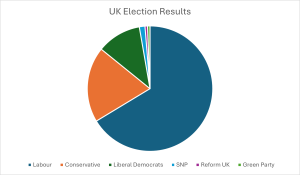Keir Starmer is the new Prime Minister of the UK after a landslide win by the Labour party in yesterday’s voting results.
The election has seen the best results for the party since the election of Tony Blair’s Labour Party election in 1997.
This marks not only a new administration but a dynamic shift in the political landscape of the UK – with not only a huge Labour win but one of the biggest defeats of the Conservative Party in its history.
Keir Starmer has commented that he is, “Ready to serve our country, ready to restore Britain to the service of working people.”
He also went on to say, “Change begins now.”
 Seats won in UK general election:
Seats won in UK general election:
Labour: 412
Conservative: 121
Liberal Democrat: 71
Scottish National Party: 9
Reform UK : 4
Green Party : 4
However, there have been both close results and losses for Labour. In Wales, traditionally a Labour stronghold, Labour’s vote share is down four points, although overall the Tories faced a wipeout in the country.
Significantly, despite their overall success, Labour has lost seats to pro – Gaza independent candidates. The issue has proven a challenge for the Labour Party, with a huge rise in support for Pro – Palestinian candidates in areas such as Leicester, Blackburn, Batley and Dewsbury.

There has been a number of independent candidates who have made the conflict the central focus of their campaign – and it has seen some success in the election results, with some candidates winning and others giving close competition to Labour, with marginal wins.
It seems that the party has struggled in areas with a high proportion of Muslim voters. An example is the shock loss of prominent Labour MP Jonathan Ashworth who lost his Leicester South seat.
He lost to a successful Independent with a focus on the conflict, the newly elected MP for Leicester South, Shockat Adam, who won the seat by 1,000 votes.
Speaking as the results were announced Adam said: “I don’t even have an official campaign manager. But we as a city have done this. We as a city are an example to the rest of the world that it is the people that matter, it’s the people that rule over us. And finally, a voice for the voices. It’s very small, a humble token, a humble gesture.”
He then raised a traditional scarf and stated: “This is for the people of Gaza”.

A closely contested seat for Labour was Ilford, where the Shadow Health Secretary, Wes Streeting won by only 528 votes more than Independent and pro – Palestinian campaigner Leanne Mohamed.
The outcry over the Palestinian crisis was also heard in Blackburn, where the Independent candidate Adnan Hussain defeated Labour candidate Kate Hollern, who had been the MP there since 2015.
A Solicitor by profession, Mr Hussain pledged to be a “voice for the whole community” and to represent local residents growing concern and anger over the UK government stance on the conflict.
The issue is particularly prominent in Blackburn, in which nearly one third of the population are Muslim. Mr Hussain got 10,518 votes, with the Labour candidate getting 10,386.
In his campaign on the run up to the election, he stated that the crisis in Gaza would be:
“Heard loud and clear in places where our so – called representatives have failed.”
This result further reinforced the feeling by many that the main parties in the UK are not doing enough to end the suffering generated by the ongoing conflict.

Another notable Independent win was Jeremy Corbyn, who was re – elected as MP for Islington North, which he has held since 1983. The results make him London’s longest serving MP.
Mr Corbyn, a former Labour leader, who is now an Independent candidate, beat Labour candidate Praful Nargund. Mr Corbyn gained 24,120 votes against Nargund’s 16,873, a win of 7,247.
In his winning speech, Corbyn said: “Ours is a positive campaign trying to bring hope to people.”
He continued: “The only way that we that we solve the problems of our community is by uniting our communities.
Mr Corbyn went on further to attribute his success to his stance on Gaza, by saying that voters are: “Looking for a government that on the world stage will search for peace, not war, and not allow the terrible conditions to go on that are happening in Gaza at the present time.”
Mr Starmer has stated that he would like to recognise a Palestinian state, but only under certain conditions and as part of a wider peace process. He has acknowledged Israel’s right to self-defence but has stated that all countries should “be properly held to account in the court of international law.”
The Labour Party’s official line is that they are committed to the support of a renewed peace process and a two – state solution.
He has also stated that he would review the issue of arms sales to Israel.
There have also been significant gains by other Parties, such as Reform, which has taken a large share of votes from both the Labour and Conservative Parties. Formerly known as the Brexit Party, Reform UK have met with considerable success, despite only having been formed quite recently compared with many other parties.
Nigel Farage, leader of the Party commented: “It’s not just disappointment with the Conservative Party, there is a massive gap on the centre – right of British Politics and my job is to fill it.”
The Liberal Democrats have also seen good results, along with a significant rise in support shown for the Green Party.
The Green Party has been celebrating its most successful election result so far – winning four seats. Party co – leader Carla Denyer stated that the seat of Bristol had made history by electing her as it’s first Green MP.
There has also been an overall rise in Independent candidates in the run up to the election, perhaps symbolising a move in support to voices outside the mainstream party for change in the UK.
For now, the Labour Party are the new UK Government and Sir Keir Starmer the new UK Prime Minister.
Following a meeting with King Charles at Buckingham Palace, where Starmer was formally invited to form a government, the new leader made a passionate speech to the UK – focused both on those who have voted for him and also those that did not.
“Now our country has voted decisively for change. For national renewal and a return of politics to national service.” He commented.
In his speech the new PM directly addressed the issue of voter apathy – the feeling of disillusionment with UK politics that many across the country have expressed.
“When the gap between the sacrifices made by people, and the service that they receive from politicians grows this big, it leads to a weariness in the heart of a nation, a draining away of the hope, the spirit, the belief in a better future.”
However, Mr Starmer also pledged to fight this – with the statement: “Our work is urgent – and we begin it today”.




